Overview
When considering care options for yourself or a loved one, it’s essential to understand the differences between 24/7 homecare services and nursing homes. Homecare provides personalized support and flexibility, allowing individuals to receive care in the comfort of their own homes. This can be particularly beneficial for emotional well-being, as familiar surroundings and tailored care foster a nurturing environment.
On the other hand, nursing homes offer structured medical oversight, which can be crucial for individuals with complex health needs. However, these facilities may impose rigid routines that can sometimes lead to feelings of isolation. It’s important to weigh these factors carefully.
In addition, many families find that homecare enhances emotional connections and promotes a sense of independence. This option can be a comforting choice, ensuring that your loved ones feel valued and understood.
As you explore these options, remember that your comfort and peace of mind are our priority. We’re here for you, ready to provide the support you need during this journey.
Introduction
As families navigate the complex landscape of long-term care, it’s essential to understand the differences between homecare and nursing homes. This understanding is crucial for making informed decisions that truly reflect the needs of your loved ones. Homecare offers a personalized approach, allowing seniors to receive support in the comfort of their own homes, which fosters independence and emotional well-being. In contrast, nursing homes provide structured environments equipped with comprehensive medical supervision, catering to those with more complex health needs.
With statistics indicating that a significant portion of the aging population will require some form of long-term care, the importance of evaluating these options cannot be overstated. This comparative overview sheds light on the benefits and challenges of both care settings. We’re here to empower families to choose the best solutions for their loved ones in an increasingly demanding healthcare landscape. Your comfort and peace of mind are our priority as you navigate this journey.
Understanding Homecare and Nursing Homes: A Comparative Overview
Homecare 24/7 encompasses a variety of health and social services that are delivered in the comfort of a person’s home, enabling them to retain their independence while receiving tailored assistance. Services range from help with daily activities and companionship to specialized support provided by Private Duty RNs and LPNs. In contrast, nursing homes, or skilled nursing facilities, present a structured environment with around-the-clock medical supervision, primarily catering to individuals with complex health needs. These facilities are designed for those requiring constant supervision and intensive medical assistance, making them suitable for individuals with chronic conditions or disabilities needing a higher level of attention.
Current statistics reveal that approximately 70% of individuals aged 65 and older will need some form of long-term support during their lifetime, highlighting the importance of understanding available support options. By 2025, around 9% of assisted living communities will exclusively accommodate adults with dementia, underscoring the specialized nature of certain facilities and the necessity for families to consider their loved ones’ specific needs. Furthermore, more than half of assisted living residents require help with basic activities such as walking and bathing, as noted by Registered Nurse Matthew Clem, indicating a significant demand for supportive services that homecare can provide in a more personalized setting.
Expert opinions emphasize the benefits of homecare services, particularly in nurturing a sense of comfort and familiarity for seniors. Homecare allows for personalized care plans that adapt to individual needs, significantly enhancing quality of life. The compassionate caregivers referred by Best Care Nurses Registry not only deliver essential medical support but also offer emotional companionship, addressing the social isolation many seniors experience. In contrast, care facilities may impose a more rigid structure that can be less accommodating of individual preferences and autonomy. Moreover, care facilities have implemented infection control measures due to the COVID-19 pandemic, such as testing and vaccination initiatives, which may heighten health and safety concerns for families considering these establishments.
Practical examples illustrate the effectiveness of homecare services. Families often report decreased stress and improved well-being when their loved ones receive support in a familiar environment, allowing for a more tailored approach. Additionally, homecare services provide greater flexibility, with options for 24/7 support without the need for long-term commitments, making them a viable alternative to assisted living facilities. The ability to integrate pet-friendly assistance options further enhances the comfort and emotional support offered to seniors, enabling them to remain in a familiar setting with their cherished pets.
In conclusion, recognizing the essential differences between in-home support and assisted living facilities is vital for families exploring support options. Homecare services provide a personalized, adaptable approach that prioritizes autonomy, while care facilities offer extensive medical assistance for individuals with more complex needs. This comparative overview aids families in making informed decisions about the best support options for their loved ones, especially in light of the critical long-term assistance requirements highlighted by recent studies. To discover how Best Care Nurses Registry can assist you or your loved one, call (888) 203-2529 to schedule a consultation today. Additionally, residential health services are often more economical than nursing facilities, making it a sensible choice for many families.
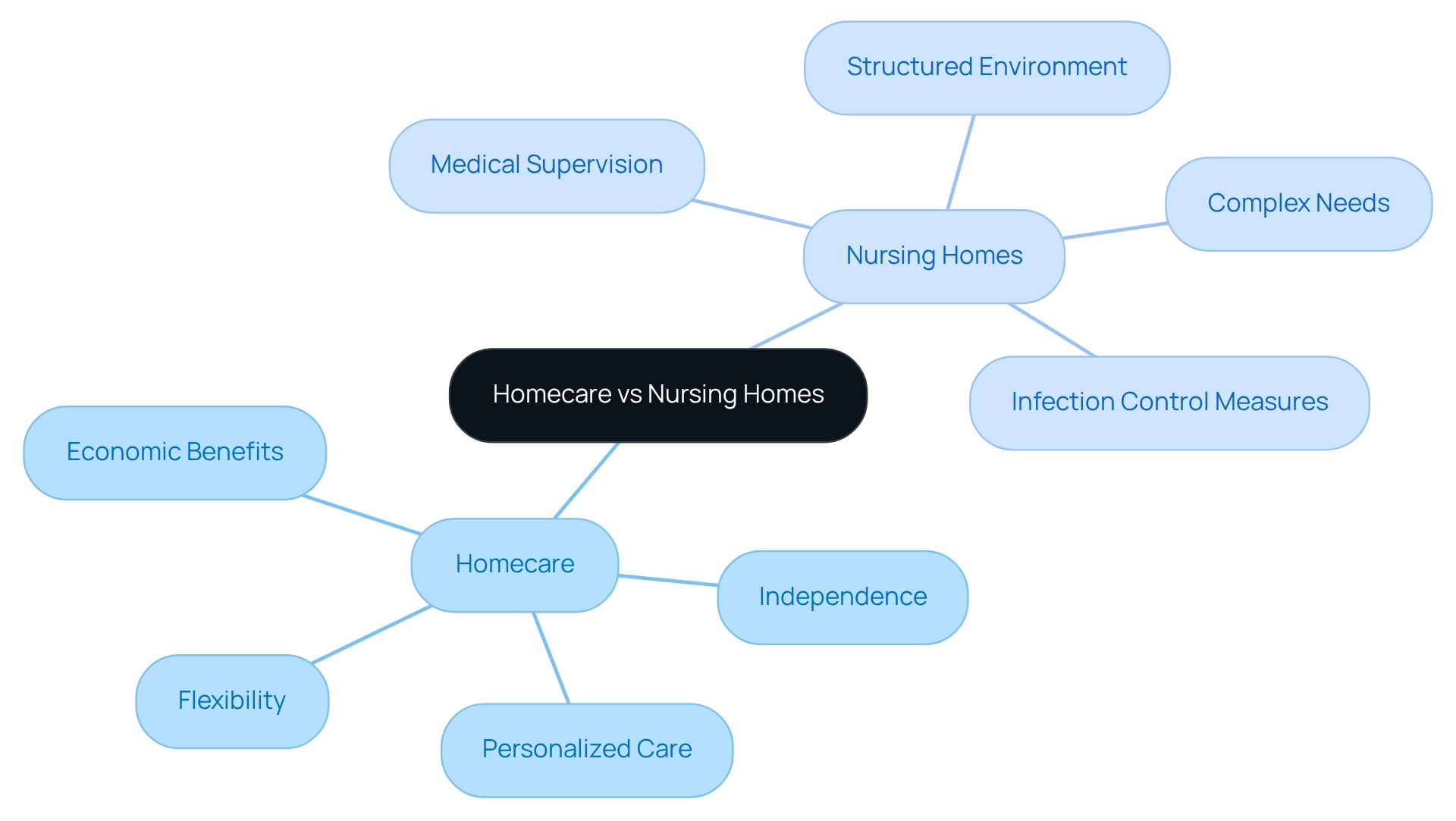
Advantages of 24/7 Homecare: Personalized Support and Flexibility
Advantages of 24/7 Homecare: Personalized Support and Flexibility
One of the standout benefits of 24/7 homecare is the personalized support it offers through Best Care Nurses Registry. Caregivers can customize their services to align with the unique needs and preferences of each individual, fostering a sense of comfort and familiarity. This adaptability allows for real-time adjustments in care as health conditions evolve, ensuring that seniors receive the appropriate level of assistance consistently. Furthermore, homecare allows seniors to stay in their own residences, surrounded by beloved possessions and memories, which greatly improves their emotional well-being. The ability to maintain daily routines and engage in familiar activities contributes to a higher quality of life, especially when compared to the often rigid schedules found in nursing homes.
Key Features of 24/7 Homecare:
- Payment Options: Flexible payment plans to accommodate various financial situations.
- No Minimum Hours: Services can be tailored to fit the specific needs of each client without minimum hour requirements.
- Long-Term Support Insurance Claims Assistance: Help in navigating insurance claims for long-term support.
Research indicates that homecare 24/7 can lead to better health outcomes, improved medication management, and reduced hospital readmissions, underscoring the effectiveness of personalized support in providing continuous in-home assistance. Best Care Nurses Registry offers extensive assistance for family caregivers, ensuring peace of mind by knowing that a professional provider is delivering quality support.
Pros and Cons of 24/7 Homecare vs. Nursing Homes:
- Pros: Personalized attention, continuity of care, emotional support, and the comfort of home.
- Cons: Potentially higher costs depending on the level of assistance required.
Case studies, such as “In-Home Care vs. ‘Nursing Homes,’ indicate that in-home assistance offers personalized attention and continuity, leading to improved quality of life and financial efficiency for families. As mentioned by Lea Muir, “This proposal reflects a long-term shift in how senior support is funded and structured, emphasizing independence, cost efficiency, and in-home resource flexibility.” This transition towards homecare 24/7 reflects a growing emphasis on independence and resource flexibility, making it a compelling option for seniors seeking comprehensive support.
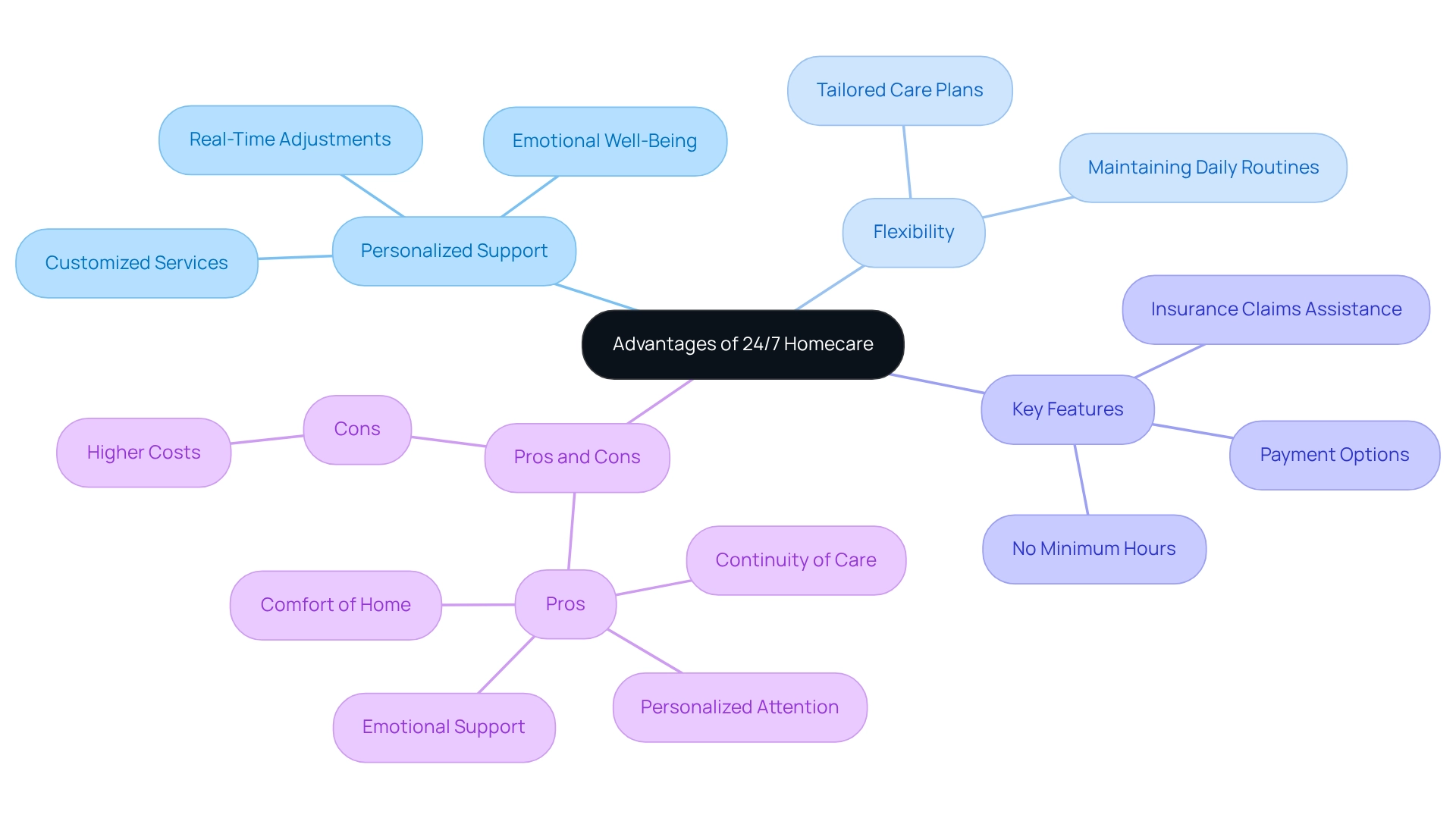
Benefits of Nursing Homes: Structured Care and Medical Oversight
Nursing facilities offer substantial benefits for individuals who require extensive medical attention and oversight. These facilities are staffed with a complete range of healthcare specialists, including registered nurses, licensed practical nurses, and certified healthcare assistants, ensuring that residents receive timely medical attention when needed. The organized setting of care facilities is designed to assist individuals with long-term conditions, providing access to therapies, rehabilitation services, and ongoing health monitoring. This degree of support is especially advantageous for individuals lacking relatives to help or who need specialized medical treatments that cannot be provided at their residence.
Furthermore, care facilities encourage social interactions among residents, which can reduce feelings of isolation and improve overall well-being. With 13.4 percent of assisted living facilities having dedicated units for individuals with dementia, the emphasis on specialized support is clear. Moreover, the significance of organized support is underscored by the fact that 16% to 27% of falls in assisted living facilities are linked to dangers within the establishments, highlighting the necessity for attentive supervision.
As the healthcare environment evolves, the role of assisted living facilities in delivering vital medical support remains crucial, especially as turnover rates in these establishments stay elevated, with job levels expected to stabilize only by 2027. However, families should also consider options such as residential health support services offered by Best Care Nurses Registry. Homecare 24/7 services are less costly, more convenient, and equally effective as the assistance provided in nursing facilities. This approach not only addresses safety and convenience but also offers emotional support, easing the persistent worry and guilt that relatives may experience. The vital functions of Certified Nursing Assistants (CNAs) and Home Health Aides (HHAs) in aiding with daily living tasks further enhance the quality of life for seniors, making homecare 24/7 an appealing choice for families seeking compassionate and effective assistance.
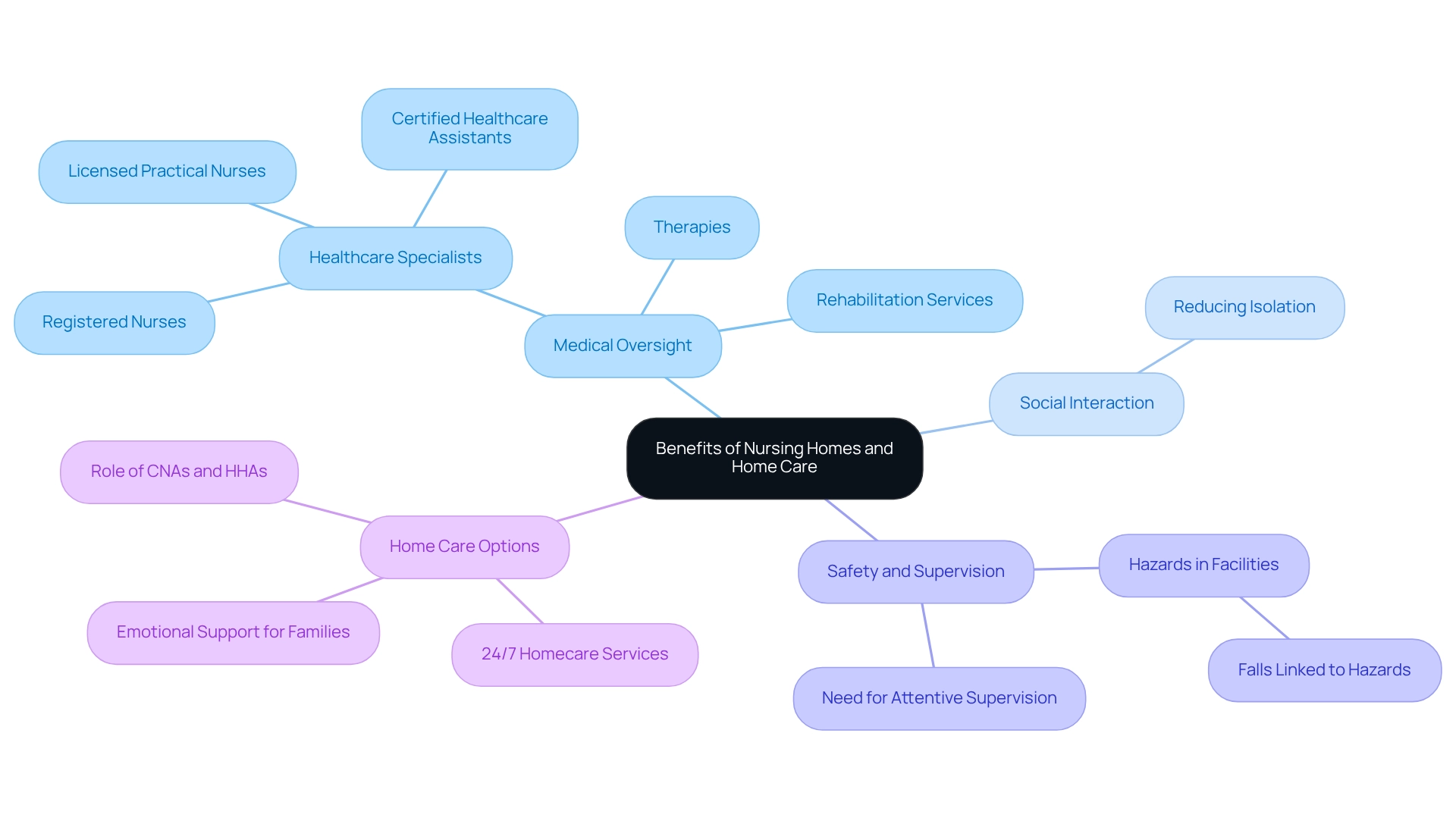
Evaluating Drawbacks: Challenges of Homecare and Nursing Homes
While homecare 24/7 provides personalized support tailored to individual needs, it may not be the ideal solution for everyone. A major issue is the persistent caregiver deficit, which can lead to irregular assistance and heightened stress for relatives. In 2025, the homecare sector continues to grapple with these shortages, with many caregivers unaware of local support systems—61% report lacking knowledge about available resources. This gap complicates coordination of support, making it difficult for relatives to ensure that caregivers are not only available but also sufficiently trained to handle specific medical needs. The emotional impact of this weight can be significant, as relatives often feel inundated by the obligation of organizing support for their loved ones.
Conversely, assisted living facilities offer organized assistance but have their own set of disadvantages. Residents often face feelings of isolation and a diminished sense of independence, as they must conform to the facility’s routines. Financially, nursing facility services can be considerably more costly than at-home assistance, putting pressure on household budgets. In fact, the typical U.S. woman aged 55 or older offers over 182 hours of unpaid assistance each year, emphasizing the strain many households endure when looking for support options. Moreover, it’s essential to acknowledge that around 40% of care workers are individuals of color, illustrating the variety within the workforce that can influence caregiver availability and assistance.
Assessing if a loved one requires companion or sitter services entails observing their daily routine and searching for indications that they might gain from extra support. Social isolation is a key indicator; if they seem lonely, depressed, or withdrawn, it suggests a need for more social interaction and emotional support. Difficulty with daily tasks, such as cooking, cleaning, or managing medication, can also indicate the need for help. Furthermore, safety concerns, like frequent falls or accidents, suggest they would benefit from having someone present to ensure their safety. Comprehending these challenges is crucial for households as they consider their options between homecare 24/7 and nursing homes, ensuring they make informed choices that best suit their loved ones’ needs. Future legislative efforts concentrating on comprehensive caregiver support, including extended paid leave and access to resources, may offer some relief to households facing these challenges. Furthermore, ongoing initiatives like the proposed federal rules aimed at strengthening home- and community-based services highlight the need for increased support and transparency in homecare 24/7. By considering these factors, households can better navigate the complexities of care coordination and make choices that prioritize the well-being of their loved ones.
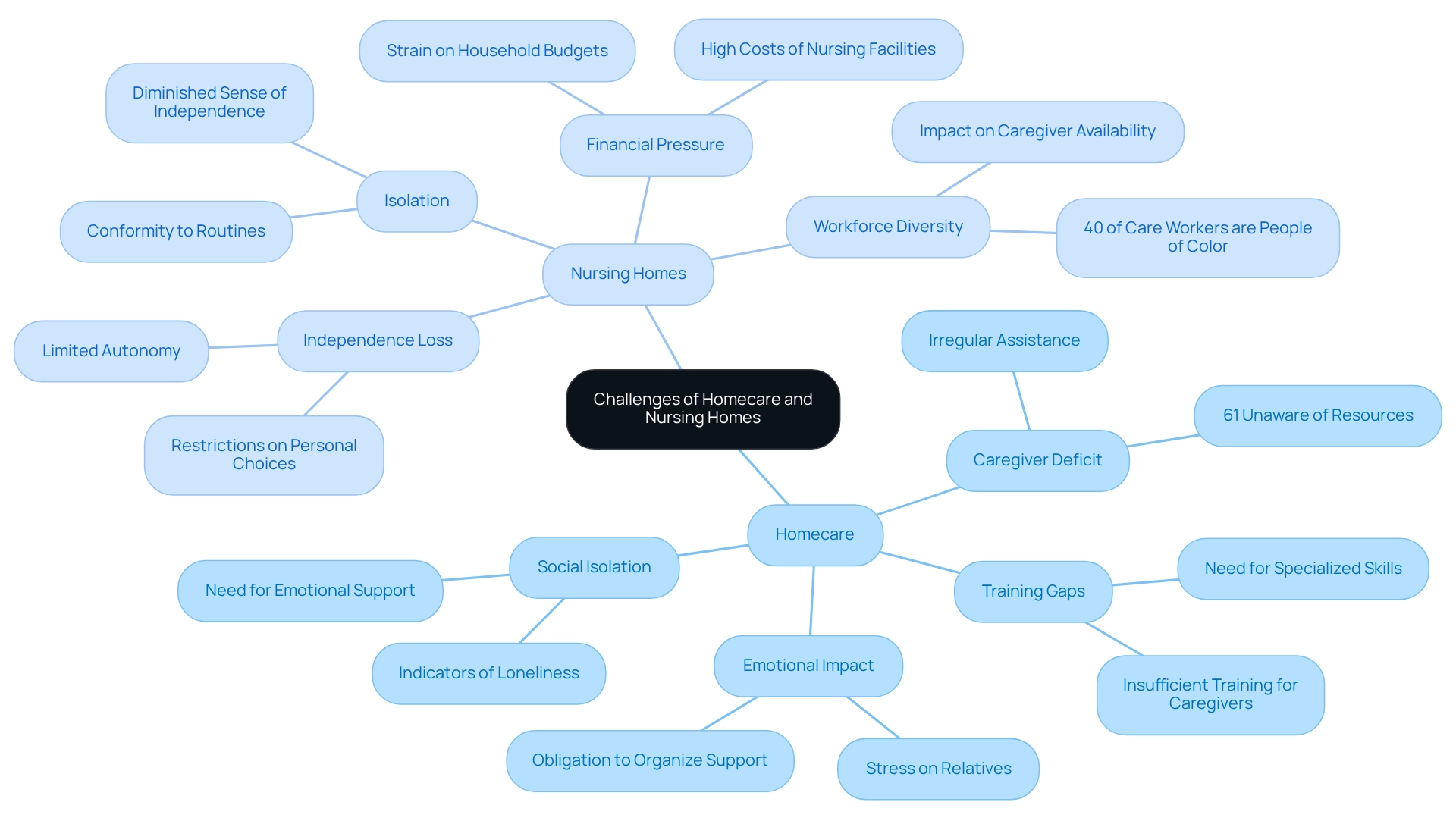
Making the Right Choice: Key Considerations for Families
When households face the choice between personal care and care facilities, several essential factors must be considered. First and foremost, it’s important to assess the individual’s medical needs and level of independence. Those requiring extensive medical oversight may find care facilities more suitable, while individuals with greater independence often thrive in a homecare setting.
Financial considerations also play a significant role; homecare can frequently be more economical, allowing families to explore various insurance options to enhance their benefits. Emotional and social needs are equally vital. Maintaining connections with loved ones is crucial for emotional well-being, and homecare typically supports these relationships more effectively than nursing homes. In fact, nearly one-third of Americans have cared for an elderly, ill, or disabled family member, underscoring the growing demand for supportive homecare services that enable seniors to remain in familiar surroundings. As Jim Rohn wisely stated, “One individual valuing another signifies life’s greatest worth,” highlighting the importance of individualized support in this decision-making process.
At Best Care Nurses Registry, we prioritize a personalized planning process for assistance. Families can reach out at (888) 203-2529 to connect with our friendly team, who will help create a customized home health service tailored to the specific needs of their loved ones. We also provide a personalized caregiver matching service, ensuring that compassionate caregivers are chosen based on each individual’s unique preferences and requirements.
Additionally, families should consider seeking expert advice during this decision-making process. Geriatric managers often emphasize the importance of prioritizing the individual’s comfort, safety, and quality of life. Engaging in discussions about the specific needs of a loved one can lead to more informed choices. Furthermore, case studies demonstrate that asking essential questions regarding quality and personalization can significantly influence the decision-making process. The case study titled “Top Key Questions for Home Care Agencies” serves as a practical resource for families to ensure they are making informed decisions about care quality.
Ultimately, the choice between homecare and nursing homes should center on the individual’s unique circumstances, ensuring that their comfort and well-being remain the top priority. With states like California, Texas, and Florida being key drivers of market growth due to large senior populations, the demand for homecare services is on the rise, particularly in Florida, where Best Care operates.
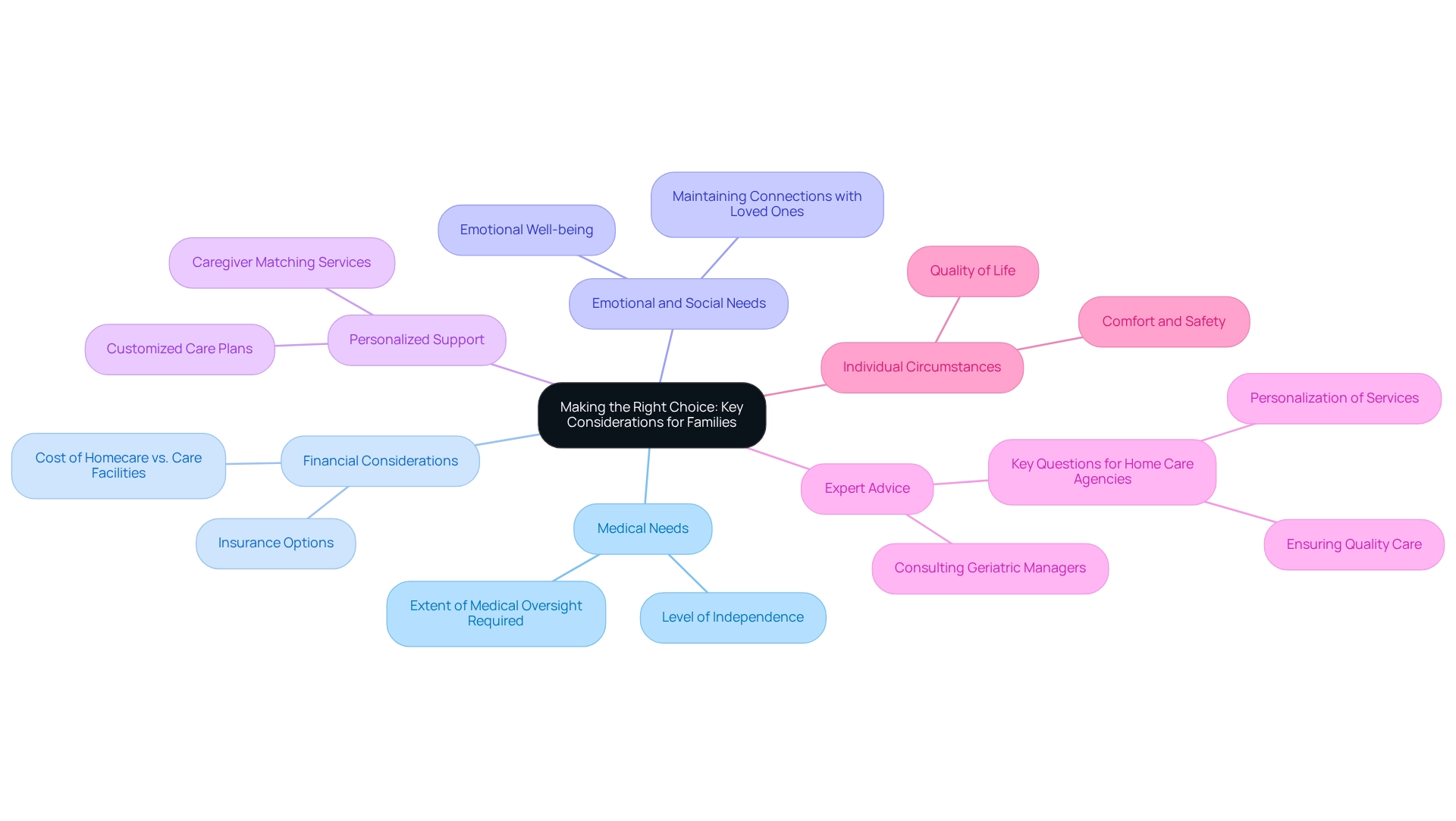
Conclusion
Understanding the differences between homecare and nursing homes is crucial for families navigating long-term care decisions for their loved ones. Homecare offers personalized support in a familiar environment, promoting independence and emotional well-being. On the other hand, nursing homes provide structured medical supervision for those with complex health needs. Each option presents its own advantages and challenges, making it essential for families to carefully evaluate their loved ones’ specific requirements, preferences, and financial considerations.
As our aging population continues to grow, the demand for both homecare and nursing home services is set to increase. Families must thoughtfully weigh factors such as medical needs, emotional support, and financial implications when choosing the best care solution. The shift toward personalized care highlights the importance of addressing individual needs, which can significantly enhance the quality of life for seniors.
Ultimately, the decision should be guided by a deep understanding of the available options and a commitment to prioritizing the comfort and well-being of loved ones. By considering these key elements, families can navigate the complexities of long-term care and make informed choices that truly reflect the needs of their seniors. Remember, ensuring your loved ones receive the care and support necessary for a fulfilling life is our shared priority.
Frequently Asked Questions
What is Homecare 24/7?
Homecare 24/7 encompasses a variety of health and social services delivered in a person’s home, allowing them to maintain independence while receiving tailored assistance, including help with daily activities and specialized support from Private Duty RNs and LPNs.
How does Homecare differ from nursing homes?
Homecare provides personalized, adaptable support in a familiar environment, while nursing homes offer a structured setting with around-the-clock medical supervision for individuals with complex health needs requiring constant supervision and intensive care.
What percentage of individuals aged 65 and older will need long-term support?
Approximately 70% of individuals aged 65 and older will require some form of long-term support during their lifetime.
What specific needs do assisted living communities cater to?
By 2025, around 9% of assisted living communities will exclusively accommodate adults with dementia, reflecting the specialized nature of certain facilities.
What are the benefits of homecare services for seniors?
Homecare services provide personalized care plans, emotional companionship, and allow seniors to stay in their own homes, which enhances their quality of life and reduces social isolation.
What are some challenges associated with care facilities?
Care facilities may impose a rigid structure that can limit individual preferences and autonomy, and they have implemented strict infection control measures due to the COVID-19 pandemic, raising health and safety concerns.
How can homecare services improve the well-being of seniors?
Families often report decreased stress and improved well-being for their loved ones receiving support in a familiar environment, with tailored approaches enhancing comfort and emotional support.
What are the advantages of 24/7 homecare?
Advantages include personalized support, flexibility, the ability to maintain daily routines, and emotional well-being from staying in a familiar setting.
What payment options are available for 24/7 homecare services?
24/7 homecare services offer flexible payment plans and do not have minimum hour requirements, allowing for tailored services based on individual needs.
What are the pros and cons of 24/7 homecare compared to nursing homes?
Pros include personalized attention, continuity of care, emotional support, and comfort of home. Cons may include potentially higher costs depending on the level of assistance required.
What is the overall trend regarding senior support services?
There is a growing emphasis on independence, cost efficiency, and resource flexibility in senior support, with a shift towards homecare 24/7 as a compelling option for comprehensive support.











